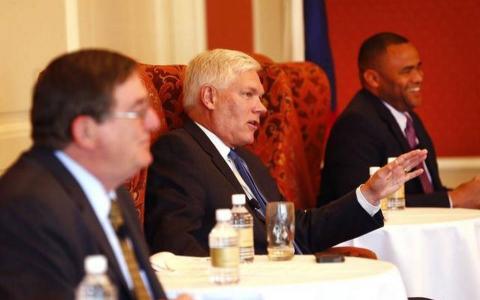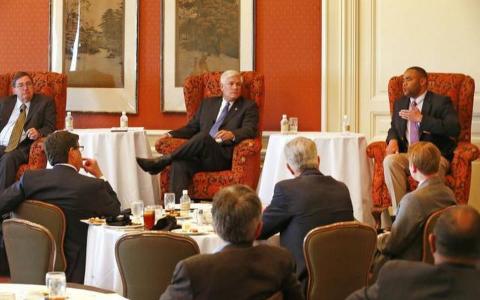How high will the transportation bill climb?

U.S. Representative Pete Sessions (center) speaks during a meeting about local issues with area business leaders including the Texas Association of Business, Texas Association of Manufacturers and the Fort Worth Chamber of Commerce during a luncheon at the Fort Worth Club Thursday. Reps. Michael Burgess (left), and Marc Veasey (right) attended the event as well. RON JENKINS STAR-TELEGRA
Congressional members are working to hammer out a transportation bill in the coming months that provides enough funding in the right places to keep drivers nationwide moving.
But one question remains:
"Will we spend enough money or have enough money?" asked U.S. Rep. Pete Sessions, R-Dallas, during a congressional roundtable luncheon Thursday at the Fort Worth Club.
Sessions, along with U.S. Reps. Michael Burgess, R-Lewisville, and Marc Veasey, D-Fort Worth, touched on a variety of business issues for dozens of business leaders at the event hosted by the Texas Association of Business, Texas Association of Manufacturers and the Fort Worth Chamber.

U.S. Representative Marc Veasey (right) speaks during a meeting about local issues with area business leaders including the Texas Association of Business, Texas Association of Manufacturers and the Fort Worth Chamber of Commerce during a luncheon at the Fort Worth Club Thursday. Reps. Michael Burgess (left), and Pete Sessions (middle) attended the event as well. | Ron Jenkins Star-Telegram
As for transportation, Veasey said Congress needs to study indexing of the fuel tax.
"We are going to have some major transportation needs that will need to be paid for," he said. "At some point, some tough decisions will be made on how to pay for the infrastructure."
At the same time, Burgess said improving roads in Texas becomes difficult because of various environmental restrictions and requirements.
"We can't do anything because the EPA won't let us," he said, referring to one federal requirement that says 10 percent of all spending has to go to improvements such as shrubs in medians.
"In a country where growth is high and demand for infrastructure is high, let us suspend that 10 percent," Burgess said.
The congressmen addressed a variety of other issues including:
Lifting the ban on crude oil exports: Sessions said he believes it will happen. Veasey said there's "a lot of work that needs to be done" first and if the U.S. starts exporting crude, and gas prices jump back up "I don't think the American public will react kindly." Burgess noted that there is a "cause and effect relationship."
Reauthorizing the Export-Import Bank: Veasey said he believes a vote on this issue would "easily pass" but he doesn't know if this proposal will make it to the House floor. "It's a long way from getting to the floor," said Burgess, who has both supported and opposed this proposal in the past.
EPA climate change regulations: At issue is whether lawmakers can agree on landmark climate change regulations. "This issue is terribly divisive — politically and to members," Sessions said. "We need common sense." Said Veasey: "Being able to find a balanced approach on this is really tough. But we need to be able to do that."